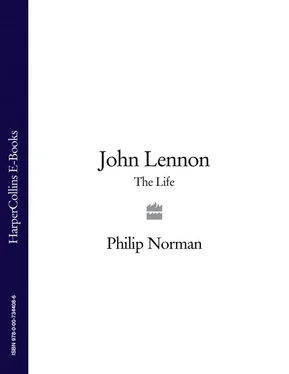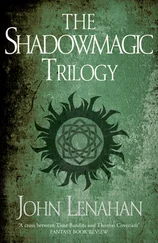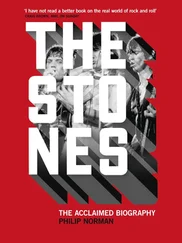Pop Stanley therefore mingled on equal terms with ships’ captains and pilots, the bluebloods of the sea. His other four daughters, though lively and strong-willed, all comported themselves in a manner befitting this social eminence, keeping company with young men destined to be navigators or marine engineers. Only Julia had ever dragged down the family by going out with ‘a mere steward’ like Alf Lennon. In his displeasure, Pop found strongest support in his oldest daughter, Mary, known as Mimi. ‘Why she picked [Alf] I’ll never know,’ Mimi would still lament at the very end of her life. ‘I couldn’t believe she ended up with a seaman. He was a good-for-nothing…the type to have one in every port. Fly-by-night is what I called him.’
Alf himself, unfortunately, possessed the same sharp wit and withering bluntness that would be among his future son’s strongest characteristics. Mingling as he did with actual bluebloods every day of his nautical life, he found the Stanleys’ attitude ludicrous, and made no bones about saying so. Whenever Julia tried to introduce him into her tight-knit family circle, there would invariably be some upset—if not with Pop then with Mimi—that ended with his leaving the house or being ordered out of it. Had the pair been left alone, Julia probably would have tired of Alf and found someone her family considered worthier of her. But, true to her nature, the more he was snubbed and criticised, the greater became her determination to hang on to him.
So their courtship meandered on through the 1930s, kept fresh when it might otherwise have staled by Alf’s periodic long absences at sea. He grew reasonably friendly with Julia’s sisters Elizabeth, Anne and Harriet, and liked her mother Annie (née Millward), a woman so sweet-natured and kind that she would sometimes buy shoes for children she saw running barefoot in the street. But Pop (whom even Mimi described as ‘a bully’) always remained bristlingly hostile. Like most young courting couples of that time, with nowhere to meet but pubs, family front parlors and park benches, Alf and Julia reached their early twenties without having experienced any physical intimacy beyond kissing and petting. In spite of Mimi’s dark suspicions about ‘one in every port’, Alf always swore he remained faithful to Julia on his travels, and wrote to her at every opportunity. The Stanleys accused Alf of being work shy—‘swallowing the anchor’ in nautical slang. However, he seems to have remained employed more successfully than a great many others in Liverpool during that era of grinding economic depression. His official Board of Trade seaman’s employment record gives the standard of his work and personal conduct for voyage after voyage as a consistent VG. At one point, Julia’s family made a highly disingenuous move to ‘help’ him by finding him a place aboard a whaling ship, which would have had the blessed result of taking him away for about two years. When Alf refused to consider the idea, Pop Stanley ordered him out of the house once again.
Alf and Julia finally married in December 1938, when he was 26 and she 24. A few weeks earlier, then Prime Minister Neville Chamberlain had returned from Munich waving the piece of paper that ‘guaranteed’ peace with Hitler’s Germany in return for abandoning Czechoslovakia to invasion and genocide. The mood of national euphoria, while it lasted, produced a sharp surge in the marriage rate as many young people felt their future to be more secure. But Alf and Julia took their belated plunge with no more thoughts of the future than they ever had. According to Alf, she dared him to do it one night at the pub, and he was never one to refuse a dare.
Neither of their families was told in advance what they had decided. On 3 December, Julia left home as if it were just another working day and at noon met with Alf at the register office in Bolton Street, behind the Adelphi Hotel. The only witnesses to the ceremony were Alf’s brother Sydney, whom he’d let into the secret at the last moment, and one of Julia’s usherette colleagues. Afterwards, Sydney stood the new Mr and Mrs Lennon drinks and a meal of roast chicken at a pub over the road called the Big House; they spent the evening at the cinema, watching a Mickey Rooney film (which happened to be about an orphanage), then separated to spend their wedding night at their respective homes. Mimi was never to forget the heart-sinking moment when Julia walked in, threw her wedding certificate onto the table and said, ‘There, I’ve done it! I’ve married him.’
Pop Stanley’s initial reaction was also one of explosive horror and disgust. But, under the gentler influence of his wife, Annie, he accepted that there was nothing that could be done—indeed, that as a conscientious father he must try his best to give the newlyweds a proper start in life. Swallowing his feelings, Pop volunteered to leave the family flat in Berkeley Street and rent more spacious accommodation so that Julia and Alf could move in with Annie and him. The chosen property was number 9 Newcastle Road, a bay-windowed terrace house a few minutes’ walk from Penny Lane and Alf’s alma mater, the Bluecoat Hospital.
The four coexisted in relative harmony throughout 1939, as war with Germany drew nearer and Britain succumbed to a fever of gasmask issuing, child evacuation and air-raid precautions. For Pop Stanley in particular, it was an eventful time. In June, a brand-new Royal Navy submarine, the Thetis , sank during her trials in Liverpool Bay. Pop joined the massive operation to recover the vessel, whose stern was initially visible rising vertically from the water. The crew considered themselves in no great peril, tapping out cheerful Morse messages to their rescuers on the steel hull as cables were passed underneath to drag it to the surface. But at the crucial moment, the cables snapped and the submarine disappeared for good, taking 71 men with her.
Alf had gone to sea again, on the SS Duchess of York , but returned home in time for the first Christmas of the Second World War. His only child with Julia was conceived at 9 Newcastle Road one day in January 1940. Finding themselves, unusually, alone in the house for a couple of hours, they made love on the kitchen floor. They had not been trying for a baby, and Julia’s immediate pregnancy was equally dismaying to them both. ‘Ninety per cent of people [of my generation] were born out of a bottle of whisky on a Saturday night, and there was no intention to have children,’ the baby would one day observe bitterly. ‘I was never really wanted.’
Julia’s pregnancy coincided with the bleakest months in Europe’s history, as Hitler’s mechanized armies swept across Belgium and France, the battered remains of the British Expeditionary Force were evacuated from Dunkirk, and RAF fighters whirled like fiery gnats around the Luftwaffe’s incoming swarms of heavy bombers. Alone and braced for invasion, the country often seemed to have nothing to sustain it but the voice of Winston Churchill, whose bulldog-like mien and gift for blood-igniting oratory made the most desperate moments seem somehow glorious.
In August, Alf sailed away again on the SS Empress of Canada . With London under nightly bombing and Britain seemingly defenceless, the RAF made a surprise hit-and-run raid on Berlin—an event that the Luftwaffe’s commander, Hermann Goering, had boasted could never happen. A furious Hitler promised to retaliate by razing all Britain’s other major cities. As a key port for the nation’s vital Atlantic food convoys, Liverpool prepared for the worst.
Julia’s sister, Mimi, would often relate how the baby’s arrival on 9 October was marked by an especially ferocious German night attack. According to Mimi, when news came that Julia had been delivered of a 71/2-pound boy, the air-raid sirens were wailing and all public transport, as usual, had ground to a standstill. Such was her excitement that she ran the 2 miles from her parents’ home to the Oxford Street maternity hospital, oblivious of bombers and their parachute-borne land mines. The worst that Hitler could do seemed trivial by comparison with this marvellous event.
Читать дальше












![John Bruce - The Lettsomian Lectures on Diseases and Disorders of the Heart and Arteries in Middle and Advanced Life [1900-1901]](/books/749387/john-bruce-the-lettsomian-lectures-on-diseases-and-disorders-of-the-heart-and-arteries-in-middle-and-advanced-life-1900-1901-thumb.webp)